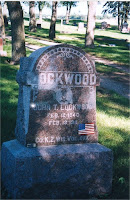
I love searching around the Internet for anything relating to genealogy that I can add to my own research.
I am blogging and searching my great grandfather Arthur Reynolds Hall this week. He was my father's grandfather. He was born September 19, 1863 in Evansville Rock County, Wisconsin to George Wilbur and Louisa Marie( Reynolds) Hall
What was happening around this happy event in my ancestors family.
In my searching I found this site
http://blogs.ancestry.com/circle/?p=870&o_iid=23560&o_lid=23560. From there I found the year in question.
this is copied from their site so not only can you read what happened but you also can have the link to more information.
The Year Was 1863
The year was 1863 and the U.S. was embroiled in the Civil War. Notable battles that year included those at Chancellorsville, Vicksburg, Gettysburg, Chickamauga, and Chattanooga. One of the most well-known battles of the Civil War,
1-3 July 1863, the Union Army, led by General George G. Meade met General Robert E. Lee and the Army of Virginia at Gettysburg, Pennsylvania to engage in one of the largest battles to ever take place on American soil involving more than 160,000 men.
Earlier that year, on 1 January, Lincoln had issued the
Emancipation Proclamation, declaring that all slaves held in Confederate states were to be free, and further declared that they “be received into the armed service of the United States.” Following this proclamation, the
54th Regiment of Massachusetts Volunteer infantry became the first northern all-Black Union regiment.
Not all of the Civil War soldiers of 1863 were volunteers. In March of that year, the
National Conscription Act began a draft registration for men between twenty and thirty-five. The conscription process allowed for wealthy men to hire substitutes or buy exemption for $300. The process angered those who couldn't afford to get out of service, and following the news of devastating casualties from Gettysburg, when a list of draftees was listed in New York papers, rioting ensued. Mobs attacked the armory and then took to the streets, targeting blacks and abolitionists in a horrific manner.
Federal troops, many of them fresh from the fields of Gettysburg, had to be called in to quell the riots.
Another proclamation by President Lincoln would be of a more peaceful nature. On 3 October, he issued a proclamation calling for a national day of Thanksgiving to be held on the last Thursday of November. (The full-text of the proclamation appeared in the 13 October 1863 issue of the “Adams Sentinel,” which can be found on the
blog entry for this article and in the
Ancestry Historical Newspaper Collection. (Click on the newspaper image in the upper right corner to enlarge it.)
In other U.S. news in 1863,
Arizona and
Idaho were organized as U.S. territories, and
West Virginia was admitted as the 35th state.
The
International Committee of the Red Cross was founded in 1863, inspired by a book written by Henry Dunant, a Swiss man who had visited an Italian battlefield and asked “Would it not be possible, in time of peace and quiet, to form relief societies for the purpose of having care given to the wounded in wartime by zealous, devoted and thoroughly qualified volunteers?”
In London, crowds gathered in January hoping for a ride on the
first underground train, a project aimed at cutting down on the congestion on London streets.
There is a printer friendly copy of this which I copied and put in my genealogy binder with his other information. As I am showing my grand children and others this book, not only are they looking at recording of births, deaths, children , the census reports and pictures of my great grandfather Arthur and family, there is history around this period of time for them to read.





.jpg)